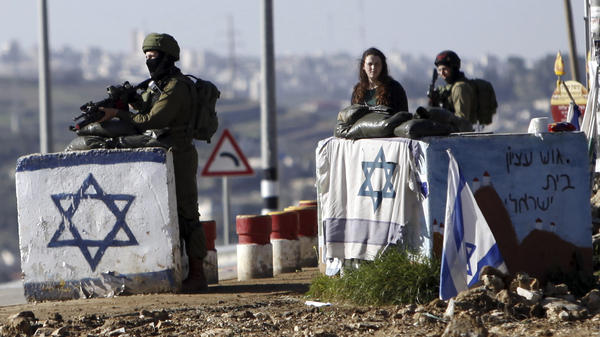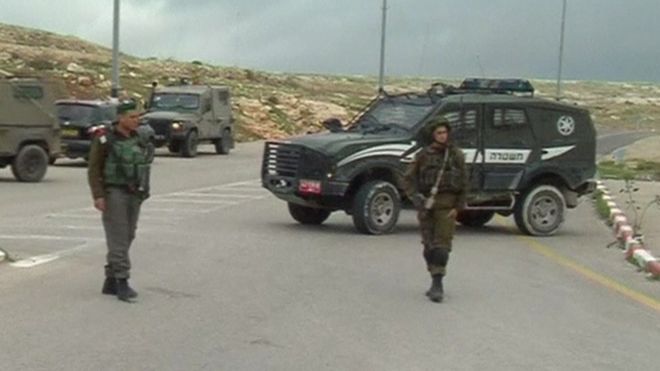Where there are settlers there are soldiers

Masked Israeli soldiers guard the Jewish settlement of Gush Etzion, West Bank. Photo by Mahmoud Illean/AP
The impact of settlements on children
By Justin Randle and Emma Fullerton, LPHR blog
April 28, 2017
In a series of recent reports, the UN Office for the Coordination of Humanitarian Affairs (UNOCHA) collected and analysed data on the de facto expansion of three settlement areas (Asfar in Hebron governorate; Talmon and Nahliel in Ramallah governorate; and Elon Moreh in Nablus governorate), producing a report on each area and a fourth report offering conclusions and recommendations.
The reports describe the ongoing efforts by Israeli settlers to increase their spatial control over surrounding areas and natural resources, alongside attempts to remove a Palestinian presence. Key findings from the reports include:
- A settlement can control and restrict access for Palestinians to an area more than twice the size of the designated boundaries of the settlement itself.
- Settlements have ‘deprived Palestinians of their property and sources of livelihood, restricted their access to services and given rise to a range of threats.’
- Palestinians are subject to direct attacks by settlers and that the vast majority of attackers go unpunished due to lax law enforcement.
- Most of the expansion activities lacked official authorisation from Israeli authorities but took place with the acquiescence or active support of the Israeli authorities.
- Informal settlement expansion is widespread and not limited to the settlement areas covered in the above-mentioned reports: UNOCHA collected evidence identifying similar patterns in another eight settlement areas. The establishment and continuous expansion of Israeli settlements, in contravention on international law, is a key driver of humanitarian vulnerability.
Gerald Horton, a lawyer for Military Court Watch, reports that Palestinian villages near settlements or their supporting road networks are ‘inevitable friction points’ as a result of various measures taken by the Israeli forces to protect Israeli settlers living in the West Bank. Such measures include a significant military presence, movement restrictions, house demolitions and military raids on Palestinian homes. These measures represent specific risks for children.
An increased military presence: night raids and child detention
Israeli settlements have been called ‘friction points’ for the arrest and detention of children and evidence collected by Military Court Watch indicates that the overwhelming majority of arrests in the West Bank occur within a few kilometres of a settlement or a road used by settlers. The majority of children are arrested from their West Bank homes during the middle of the night by heavily armed Israeli soldiers. In February 2017, 164 Palestinian adults and children were arrested at night. A military raid on a child’s home, whether or not it results in the child’s arrest, is likely to be a terrifying experience for the child.
The outcome of an increased military presence near settlements, including frequent military incursions during the day and night, is that thousands of Palestinian children are detained and exposed to violence. Each year approximately 500-700 Palestinian children, some as young as 12 years old, are detained and prosecuted in the Israeli military court system. Although under Israeli military law children under 12 cannot be arrested, they are frequently detained. Abuse of children during their arrest, transfer, interrogation and or detention continues to be widespread, with 60% of children reporting they were subjected to some form of physical violence in 2016. The majority of children taken to an Israeli Prison Service facility are strip searched on arrival.
The military courts play an important role in intimidating Palestinians living close to settlements. The conviction rate of Palestinians in the military courts is well above 99%. The most common charge against children is stone throwing. For youths convicted of throwing stones without causing injuries, the average custodial sentence is about three months. Every child convicted in the military court will also receive a suspended prison sentence. The effect of the suspended sentence is that, once the child is released from prison, he takes a big risk every time he leaves home. As Horton explains, if the child happens to be at the village shop when an Israeli military convoy goes by, there is a good chance he will be swept up in the ensuing clashes and sent back to prison.
An increased military presence also sees children subject to physical and other abuse by Israeli soldiers. In testimony published by Breaking the Silence, a former Israeli soldier said, ‘our violent behaviour eventually included daily abuse of the Palestinian residents, daily delays of Palestinians and Palestinian families, children, parents… for hours on end… everyone around me acted this way’. Her testimony corresponds with that of many former soldiers. The exceptionally low number of indictments served on Israeli soldiers suspected of harming Palestinians reflects the ‘near impunity’ of Israeli soldiers, according to Yesh Din.
Disrupted education
Schools near settlements appear especially vulnerable to attack. Soldiers raid schools, disrupting children’s education. Across the West Bank, attacks regularly begin with settlers and are finished off by the Israeli military. UNRWA reported that more than 205 tear gas canisters were fired into UNRWA institutions, such as schools, in 2015. UNRWA students lost 83 days of school between October 2015 – March 2016 due to military activity. Children are also often required to move through a system of intimidating military checkpoints to access schools and other basic services, coming into daily contact with armed settlers, Israeli soldiers and police.
Settler violence
Palestinian children are subjected to settler violence and intimidation on a regular basis, and accountability is rare. UNOCHA notes that the temporal and geographical proximity between violent attacks by settlers and takeover of new areas of Palestinian land suggest that ‘settler violence against Palestinians is not random but is often a calculated step towards settlement expansion’.
Video of settler attacks on Palestinian children, voice over in English
Living conditions
Settler attacks also target agricultural land, damaging the livelihoods of Palestinian families and affecting children’s standard of living. The UNOCHA reports note that a combination of the effects of settlement expansion, such as loss of access to water sources; systematic intimidation; movement restrictions and damaged crops, may trigger a halt in cultivation that can have a long term impact on a family’s living conditions. For communities whose traditional sources of livelihood are farming and grazing, the loss of access to land due to de facto settlement expansion has had a major impact on living conditions and food security of affected families.
Article 27 of the UN Convention on the Rights of the Child (CRC) provides the right of the child to an adequate standard of living. Article 27 also imposes a duty on Israel to ‘take appropriate measures to assist parents… to implement this right and shall in case of need provide material assistance and support programmes, particularly with regard to nutrition’. Clearly, undermining families’ livelihoods breaches this duty.
House demolitions
Israeli authorities consistently demolish Palestinian structures that are perceived as hindrances to the establishment and expansion of Israeli settlements. The impact of the loss of family home on children is likely to be severe. The loss of possessions and financial losses incurred will likely impact household poverty. Loss of land can also involve the loss of leisure and recreation areas, potentially diminishing children’s right to leisure and to engage in play and recreational activities, enshrined in Article 31 of the CRC.
Children’s mental health
The fear and uncertainty caused by a militarised environment should not be underestimated. The Israeli military can appear anywhere anytime; constructing check-points, closed military zones or entering homes. Medical Aid for Palestinians listed the killing of children, house demolitions, search and arrest operations and child detention as contributors to the deteriorating mental health of children. UNRWA reported that in 2015, developmental regression, evidenced by bed-wetting, was observed in several UNRWA schools. Post-traumatic stress disorder was also diagnosed at a rate not witnessed since 2000.
Government support for continuing settlement expansion
All settlements, whether or not formally authorized by the Israeli authorities, are illegal under international law and contravene Article 49 of the Fourth Geneva Convention, which prohibits the transfer by the occupying power of its own civilian population into the territory it occupies. However, since 1967 about 130 Israeli settlements (formally authorized by Israeli authorities) and 100 settlement outposts (lacking formal authorization) have been established across the West Bank, including East Jerusalem.

Israeli soldiers on guard at the Tekoa settlement where a pregnant woman was stabbed, January 2016. Photo by AFP
Despite their illegality as ruled by the International Court of Justice and reiterated by the Security Council and the Office of the High Commissioner for Human Rights, the Israeli government supports settlement construction in a myriad of ways. These include direct state supported appropriation of land, the demolition of Palestinian homes and support for private initiatives to have Palestinians evicted from their homes, particularly in East Jerusalem. Through financial incentives, the Israeli government actively encourages commercial development in and around the settlements.
Settler outposts also receive municipal support. The United Nations reports that more than 100 unauthorized settler outposts and thousands of housing units in existing settlements have been erected over the years without the formal approval of the Israeli authorities. At least 70 of the 100 unauthorized outposts were constructed partially or entirely on privately owned Palestinian land.’ Such informal appropriation of land typically has the support of the Israeli municipal authorities. Support is given through the provision of funds, infrastructure and security, and through inaction to remove the outposts. Frequently these outposts have settler-only roads, state security, electricity and water all provided by the state.

Soldiers guard the Anatot settlement where a 13-year-old Palestinian girl was shot dead, January 2016. It was said she had run at a settlement security guard with a knife.
On 23 December 2016, the United Nations Security Council adopted resolution 2334. The resolution reaffirmed ‘that the establishment by Israel of settlements in the Palestinian territory occupied since 1967, including East Jerusalem, has no legal validity and constitutes a flagrant violation under international law and a major obstacle to the achievement of the two-State solution and a just, lasting and comprehensive peace.’ It further demanded that Israel ‘cease all settlement activities in the occupied Palestinian territory, including East Jerusalem.’ In open defiance of the resolution, on 6 February 2017, the Israeli Parliament passed a law retroactively legalizing settlement outposts on private Palestinian land.
The rights of Palestinian children are unlikely to be respected while the long history of military occupation of Palestine continues. A significant driver of this reality is the existence of illegal settlements, which create serious risks for Palestinian children. In order to fulfil its legal obligations, including those under the CRC, Israel must cease all settlement activities in the West Bank.
The information in this blog is taken from the in focus section – which is fully footnoted – of the LPHR Child Rights Bulletin for the period 27 December 2016 – 28 February 2017.
